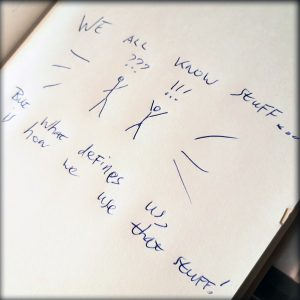22-08-2019 – The Imagineering Suite, Amersfoort (NL)
The six basic elements of a working product – Your current knowledge

This week, I will look at another element of the six basic elements of a working product. This time I will look into ‘your current knowledge’. This is one of the more abstract parts of this system, as this is a very broad topic that covers a big part of the human brain. Knowledge is, in my perception at least, equally important as eating, drinking, sleeping, breathing etc. Our knowledge lays the foundation out of which we live and act, so this has an enormous effect on the creative process.
There are two quotes that I tend to keep in mind when analysing the concept of knowledge. The first one is a thought that I formulated myself, which goes:
‘Everything you experience contributes to your overall knowledge and can be used somewhere in your life’
And a second quote ties into that directly:
‘There is no knowledge that is not power’
And yes, for the gamer cynics among us I can say: that quote was indeed used in Mortal Kombat 3. But this quote by Ralph Waldo Emmerson (whose work as an essayist is definitely worth researching!) applies well to the evaluation of the knowledge we carry with us. I am not much of a fan of the power connotation that this quote has though, but it cannot be denied that knowledge does bring a certain power with it. In the end, the person that is able to solve a problem that a group of people have not been able to solve before, will always have an advantage on the rest. However, I don’t want to focus on the concept of power compared to others, but the role that this power can have in your creative process.
During our lifetime, humans function as sponges of sorts. We go through experiences, we read, we listen, we smell etc. All these experiences make us the people we are. A human is, in a way, a living sum of all experiences, emotions and actions that finally create us as individuals. Every piece of experience, every fact and every little impulse adds to the current knowledge that resides in our subconscious.
Yet, we often feel like we are presented with useless information. Sometimes you hear little facts that make you go ‘Did I really need this?’ or a story that makes you go: ‘I have no idea what this was about, but whatever’. Still, you do take these experiences and facts with you in your subconscious. Your subconscious feeds itself on all these little nuggets of information and grows in the process. Every piece of info that you take in with full awareness, will add to your frame of reference and will provide you with new sources to take ideas from.
Because even if we all feel that life often hangs together by randomness and we often feel like we learn stuff we don’t need… It can be a rather surprising realization that all these little facts can be of use in the longer run! But when will these facts be of use then? I honestly have no idea. Every lifetime runs a different course. But I can say from experience that if you are open and willing to learn new things, you will learn things easier and you will also enjoy that process a lot more. Humans are, at the core, extremely good at connecting things and experiences mentally. Sometimes that happens instantly and sometimes it takes years. As long as you have an open attitude and a healthy subconscious you will be able to see more connections and thus understand matters better.
And if you are enjoying this process of learning new things more, your subconscious will be stimulated and you will be able to have far more creativity at your disposal. All this knowledge will contribute to have you enter the creative process in the end.
All the current knowledge that you carry, as diverse and weird as it can all be, will contribute to the development of your subconscious and how you can use that knowledge in everyday life. That is why I often recommend people to read, to listen and to experience as much as they can, because all that input will help you in your creative process.
The broader your tastes and interests are, the more you can look outside of your own comfortzone and ideas, which is always great for creativity and life in general!
And that is why it is good to sometimes look at everything we have learned in our lifes. Because when you evaluate the knowledge you have gained in a practical manner like described above, you might just be surprised by how much you already know and what you can use. And with that source of mental wealth, a lot is possible!
See you next week!
Tom




